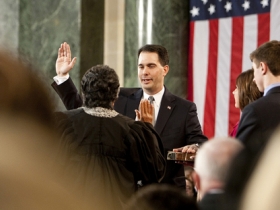Why We Need the Liberal Arts
Gov. Walker’s plan pushing colleges to prepare students for the current job market will actually hurt our economy.

Gov. Scott Walker
Why does a guy who works in New Jersey care about Governor Scott Walker’s plans to defund the liberal arts in Wisconsin’s public colleges and universities?
I lived in Wisconsin for 15 years, while serving on the faculty of the UW-Madison. My wife’s and my children were born there and I count among my dearest friends both colleagues and neighbors with whom I shared picnics and play-dates, little league and soccer games and parent-teacher nights. Even though I live in the land of the Eagles, in our family we are Packer fans. I care deeply about what happens in Wisconsin.
I was very disappointed to read about Governor Walker’s plan to make significant changes to state funding for education in Wisconsin. In his speech in California, Walker said a number of things about education, including this:
In higher education, that means not only degrees, but are young people getting degrees in jobs that are open and needed today, not just the jobs that the universities want to give us, or degrees that people want to give us?
This approach is all wrong. And it’s wrong for four fundamentally important reasons:
First, the “Walker Plan for Higher Education” seems to be premised on increasing the efficiency of the pipeline from higher education to the economy. But the assumption that the state can predict which programs of study would be most beneficial for the state’s economy is false, as demonstrated by some spectacular counter-examples. It might seem that the study of medieval history and philosophy would not be a good start for someone who might contribute a lot to the economy. But Carly Fiorina, one of the most important women in American business today, majored in (you guessed it) medieval history and philosophy. Indeed, many chief executive officers for some of the most successful companies in the American economy were liberal arts majors including history (John Loose of Corning and Sam Palmisano of IBM), sociology (Bradbury Anderson of Best Buy), philosophy (Carl Icahn of just about everything, but also currently a major stakeholder in Netflix), economics (Meg Whitman of Hewlett Packard and Donald Trump of, well, Donald Trump), and Asian studies (Sue Krosnick of Federated Department Stores). And it’s not just business leaders who majored in the liberal arts: many leaders in government did, including Supreme Court justices on both the right and the left: Elena Kagan, John Roberts, Antonin Scalia and Sonia Sotomayor all majored in history. Indeed, there is no correlation between one’s college major and the career that unfolds throughout one’s life.
Second, the Walker Plan is wrong philosophically. Governor Walker’s political party has emphasized its opposition to allowing the government to “pick winners and losers,” rather than allowing the free market to do so. But if a state agency is charged with selecting the academic programs for which students would be eligible for state funding, the state would be picking “winners and losers” in higher education. This is reminiscent of a Soviet model of education in which the state paid for students’ education and then assigned graduates to their first jobs. Governor Walker has identified neither the state agency that might be charged with the task of identifying the programs eligible for funding, nor the criteria by which the selection would be made. I wonder how these choices would be made and if those making them would have the critical thinking and problem solving skills necessary to make wise decisions when confronted with complex datasets. I wonder if the study of Arabic and Pashto, which are now critically important for those conducting our country’s foreign policy, would have seemed worthy of funding in Wisconsin in the year 2000. Of course, we have no federal university to address such decisions on a federal basis: all our public institutions of higher education are state-based institutions. Looking back is easy, but I wonder who Governor Walker will tap to predict what Wisconsin’s and our nation’s strategic needs will be 20 years from now, because if you decide to fund a university program now, you should be prepared to spend 20 years building up the expertise and strength in a university program to achieve excellence.
But fourth, and most importantly, I object to Governor Walker’s proposal because it is derived from a fundamentally flawed understanding of the purpose of the liberal arts in higher education. We are not training students for a job. We are training students for a lifetime of jobs, for a career, for their best job, by providing them with an education that emphasizes the development of critical thinking about challenging and complex problems, creative problem solving, effective communication in speech and writing, ethical reasoning and compassion, the ability to work with diverse partners, use technology wisely, and participate fully in our American democracy. Some experts predict that today’s young people will change jobs more than a dozen times during the course of their working lives and that many of those job changes will be career changes. We faculty are focused on teaching our students not facts that they can memorize and regurgitate (facts that may be outdated ten years from now), but skills they can use to analyze an ever-changing array of data, construct sound arguments on the basis of those data, and communicate those arguments effectively in speech and writing to diverse audiences.
Governor Walker is not alone in his views. Governor McRory (R-NC) is opposed to courses on gender studies and Swahili, Governor Scott (R-FL) is opposed to anthropology, and there are others who seek similarly short-sighted solutions to complex problems to save money in the short term by destroying world class universities it will take decades to rebuild.
It is clear to me as an educator that my students go on to a broad range of jobs. Indeed, data from the United States Bureau of Labor Statistics (staffed, most likely, by individuals with degrees in the liberal arts) paint a very clear picture:
- The unemployment rate in 2012 for people with a college degree was substantially lower than the unemployment rate for people without a college degree
- The median weekly wage in 2012 for people with a college degree was substantially higher than the median weekly wage for people without a college degree
People with college degrees are more likely to get a job, keep it even in a downturn, and earn more money than people without college degrees; they therefore pay more in taxes (supporting the national economy) than people without college degrees.
A study completed at the University of Cincinnati shows that “For each 10 percent rise in the number of residents with a four-year college degree, the average overall employment rate in United States metropolitan areas rose by 2 percent between 1980 and the year 2000.” In other words, there is a geographic benefit for the entire population when there are more people in the community who have completed college.
A study from the Brookings Institute suggests that metropolitan areas with higher rates of college completion had lower unemployment rates than similar metropolitan areas with lower rates of college completion. But the researchers came to other very interesting conclusions as well: cities with higher numbers of college graduates have longer life expectancies, higher incomes, and fewer single-parent families.
A survey of employers, conducted in 2010 for The Association of American Colleges and Universities, showed that employers want employees “to use a broader set of skills and have higher levels of learning and knowledge than in the past to meet the increasingly complex demands they will face in the workplace. Within this context, to the degree that employers’ emphasis on hiring will be affected by the economic downturn, the shift will be toward greater emphasis on hiring four-year college graduates.” This survey also showed that employers want employees who have
- Knowledge of human cultures and the physical and natural world
- Intellectual and practical skills such as effective communication in speech and writing, critical thinking and analytical reasoning skills, problem solving skills, teamwork skills, quantitative reasoning skills, creativity
- Personal and social responsibility, including the ability to connect choices and actions to ethical decisions
- Civic knowledge and community engagement
- The ability to apply knowledge and skills to real-world settings
All of these skills are attainable through a liberal arts education, an education imperiled by Governor Walker and others who share his views.
For all these reasons, I oppose Governor Walker’s plan and urge my friends and neighbors in Wisconsin to reject this and similar plans. And if your son or daughter comes home from college and tells you that s/he wants to major in philosophy, don’t worry. Your child could be the next Matt Groening. He seems to have done okay. For a philosophy major.
Benjamin Rifkin is Dean of the School of Humanities and Social Sciences at The College of New Jersey. A shorter version of this essay was originally published by InsideHigherEd.
















Thank you for putting all of this in perspective.
What I don’t know why a conservative in theory would want to make these choices for individuals. There is a market system in Higher Education between colleges and departments within colleges..
I do know why — contemporary conservative political thinking is not really conservative. In any case, their crossword puzzle association of Liberal with Liberal arts is misguided.
I keep forgetting we elected this guy.
Very well said, Dean Rifkin. I spent most of my life in Wisconsin, graduated from Lawrence University with a major in biology, earned my doctorate at the University of Wisconsin-Madison, and taught in the biology department at Beloit College college for 13 years. I am now the provost at a liberal arts college in Maryland. Our alumnae/i have careers that range from business executives to federal judges, teachers, physicians, and members of the Maryland legislature. Others work for nonprofit organizations. Most graduates report that their careers have taken them into fields quite different from their major. It is not my biology major that allows me to manage a complex academic division of a college. It is the broad learning, ability to continue to learn, to analyze and solve problems, work in teams, communicate, and lead that has helped me throughout my career. Liberal education, whether it happens in a liberal arts college or a public university, is the best preparation for today’s rapidly changing world.
Oh yes, like Dean Rifkin, I am still an avid fan of the Packers.
Almost all of your studies do not support your premise of value for the liberal arts. It speaks only of college degrees in general. It could be argued that liberal arts education increases the cost of college attendance and serves to insulate faculty from job loss. How many more productive citizens could be working earlier instead of spending the extra semester fulfilling all of the elective requirements?